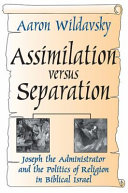

Most ebook files are in PDF format, so you can easily read them using various software such as Foxit Reader or directly on the Google Chrome browser.
Some ebook files are released by publishers in other formats such as .awz, .mobi, .epub, .fb2, etc. You may need to install specific software to read these formats on mobile/PC, such as Calibre.
Please read the tutorial at this link: https://ebookbell.com/faq
We offer FREE conversion to the popular formats you request; however, this may take some time. Therefore, right after payment, please email us, and we will try to provide the service as quickly as possible.
For some exceptional file formats or broken links (if any), please refrain from opening any disputes. Instead, email us first, and we will try to assist within a maximum of 6 hours.
EbookBell Team

4.1
90 reviewsThe work shows its readers the grand alternatives of Judaism, instilled in two larger-than-life figures, so its readers can reassess for themselves the road Judaism did not take, and understand why Joseph though admirable in many respects, is left out of the rest of the Bible.The question is answered through the stories about how Joseph, the son of Jacob, saved his people/family from famine by becoming a high-ranking administrator to Pharaoh. By analyzing his behavior to the people over whom he exercises power, Joseph lords it over his brothers, grieves his father, takes lands from Egyptian farmers, and engages in forced deportation.
Wildavsky explains why Joseph-the-assimilator is replaced in the Book of Exodus by Moses-the-lawgiver. The book ends by demonstrating that Joseph and Moses are, and are undoubtedly meant to be exact opposites.As in his earlier book on The Nursing Father: Moses as a Political Leader, Wildavsky combines analysis of political and administrative leadership with both traditional and modern study of texts: thematic linkages via plot, grammar, dreams, poetry, and religious doctrine. Thus the chapter on "Joseph the Administrator" is preceded by a chapter on Joseph as The Dream Lord" and followed by an analysis and explanation of why Jacob's obscure blessings to his sons are more like curses. Always the emphasis is on the reciprocal influence of religion and politics, on rival answers to questions about how Hebrews should relate to each other and to outsiders. New, in paperback, the book will be of interest to